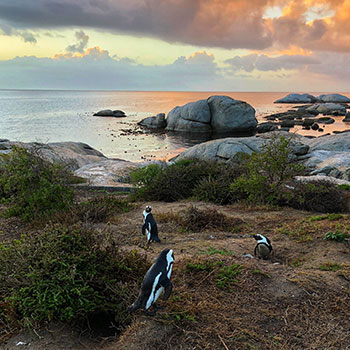The Physical Environment
Sciences & the Environment Program
Cape Town, South Africa
Dates: early Feb 2022 - early Jun 2022

The Physical Environment
OVERVIEW
CEA CAPA Partner Institution: University of Cape Town
Location: Cape Town, South Africa
Primary Subject Area: Env. Sciences
Instruction in: English
Course Code: EGS2013F
Transcript Source: Partner Institution
Course Details: Level 200
Recommended Semester Credits: 5
Prerequisites: GEO1009F
DESCRIPTION
The course focuses on contemporary Atmosphere-Earth surface interactions, in particular the role of precipitation and water from a global to a regional scale and examines temporal dynamics, driven by natural process as well as anthropogenic pressures. It covers in detail global circulation patterns, climate variability, soil formation, polar response to climate change, tropical deforestation, and desertification and earth observation technology. It concludes with a detailed study of local scale systems and applications covering stream catchments, estuaries, wetlands and coastlines. It is expected that students will enhance their understanding of Earth system dynamics, systems interactions and develop an appreciation for scales both temporal and spatial. Students are also expected to put the local context into a regional setting and make linkages to the larger global picture.
DP requirements: Satisfactory completion of practicals and all written assignments, including projects, fieldwork reports, practicals, essays and class tests. Students must attain an average mark of not less than 40% for the coursework.
Assessment: Project, essays, class tests and practical assignments including fieldwork report count 50%; one 3-hour examination written in June count 50% (subminimum of 40% required).
The University of Cape Town awards credits based on the National Qualifications Framework (NQF) to determine course and contact hour recommendations per course. 1 NQF credit represents roughly 10 notional hours of work which includes study time, assignments and examinations. Notional hours may very per courses depending on the course level and modality therefore, CEA recommends using NQF credits as a basis to determine U.S. equivalencies (1 NQF=.222 semester credits)
DP requirements: Satisfactory completion of practicals and all written assignments, including projects, fieldwork reports, practicals, essays and class tests. Students must attain an average mark of not less than 40% for the coursework.
Assessment: Project, essays, class tests and practical assignments including fieldwork report count 50%; one 3-hour examination written in June count 50% (subminimum of 40% required).
The University of Cape Town awards credits based on the National Qualifications Framework (NQF) to determine course and contact hour recommendations per course. 1 NQF credit represents roughly 10 notional hours of work which includes study time, assignments and examinations. Notional hours may very per courses depending on the course level and modality therefore, CEA recommends using NQF credits as a basis to determine U.S. equivalencies (1 NQF=.222 semester credits)










